Key takeaways:
- Dyslexia is a unique way of processing information that affects emotional well-being, requiring tailored strategies to support learning and boost confidence.
- Online resources provide valuable tools and community support, making it easier to find effective learning techniques tailored for dyslexic individuals.
- Adapting learning resources to align with personal interests and utilizing flexible, creative approaches can significantly enhance engagement and motivation in learning.
- Regular evaluation and adjustment of study methods based on the learner’s needs are essential for effective educational progress and empowerment.
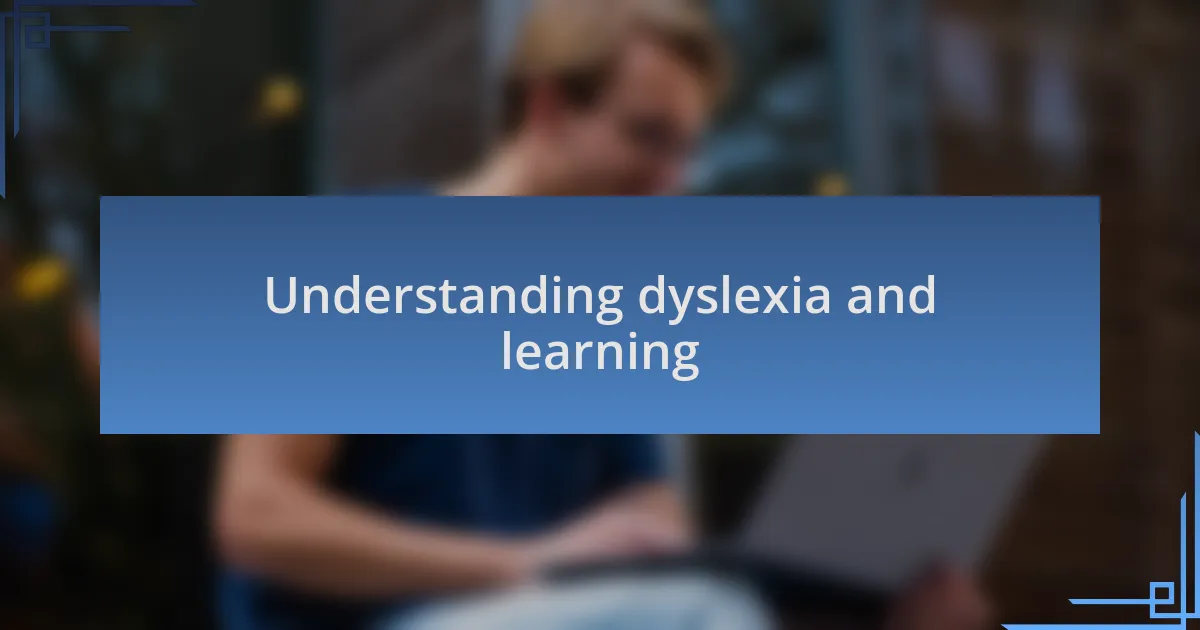
Understanding dyslexia and learning
Dyslexia is not just a reading challenge; it’s a unique way of processing information. I remember when my son first struggled with reading at school. I could sense his frustration as he labored over letters that seemed to dance on the page. It made me wonder, how many bright minds are hidden behind the struggles of dyslexia?
Understanding dyslexia means recognizing that it affects more than just reading ability. The emotional toll can be significant, often leading to a lack of confidence and self-esteem. I’ve seen firsthand how a little success can spark joy; when my son finally read a book independently, the pride on his face was priceless. It reinforced my belief that tailored strategies can truly help unlock potential.
Learning with dyslexia requires a different approach that honors the ways these individuals excel. Have you ever considered that someone with dyslexia might think differently and creatively? Embracing diverse learning styles not only eases the process but also enriches everyone’s learning experience, transforming difficulties into strengths.
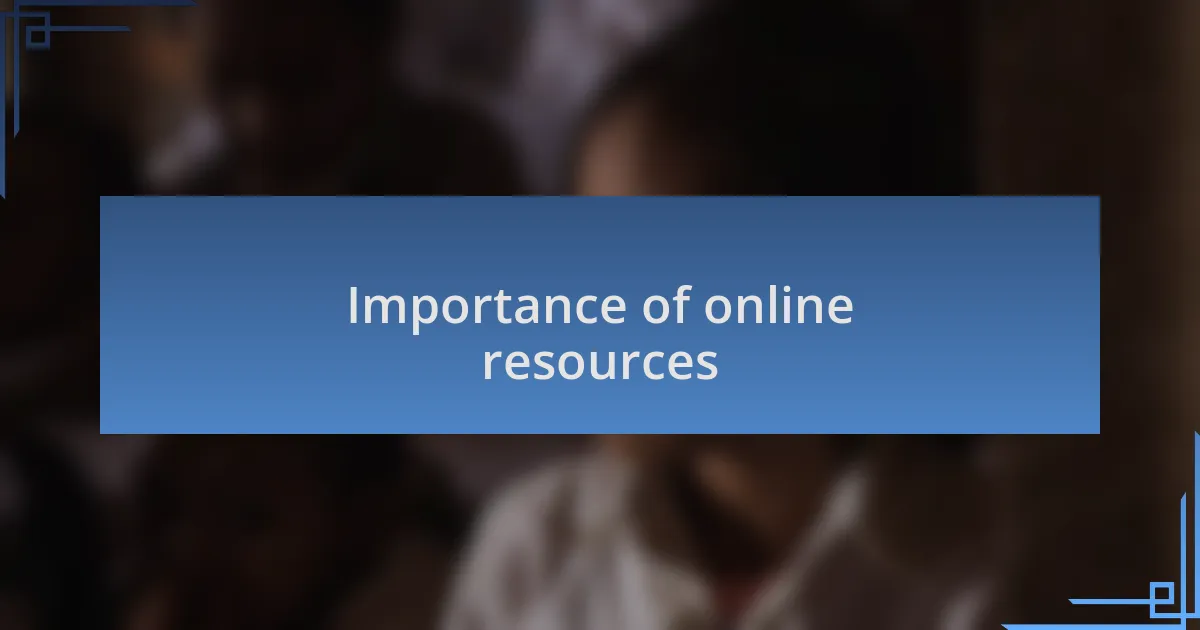
Importance of online resources
Online resources have become indispensable tools in the journey of understanding and supporting individuals with dyslexia. I recall a late night when I found a website packed with interactive exercises tailored for dyslexic learners. It was like stumbling upon a treasure trove; these resources not only shed light on effective techniques but also reignited my hope for my son’s reading progress.
The beauty of online resources lies in their vastness and accessibility. Have you ever tried to find a specialized book at your local library? It can sometimes feel like searching for a needle in a haystack. However, online platforms host a wealth of information and tools, from videos and articles to custom learning plans, all available at our fingertips. This immediate access allowed us to explore strategies that resonated with my son’s unique needs, making learning feel less daunting and more engaging.
Moreover, the support from online communities is a game changer. I vividly remember joining a forum where parents shared their experiences and successes. This sense of connection and shared understanding reminded me that we are not alone in this journey. The encouragement from others who are navigating similar challenges provided invaluable reassurance and practical advice, ultimately enriching our approach to learning and growth.
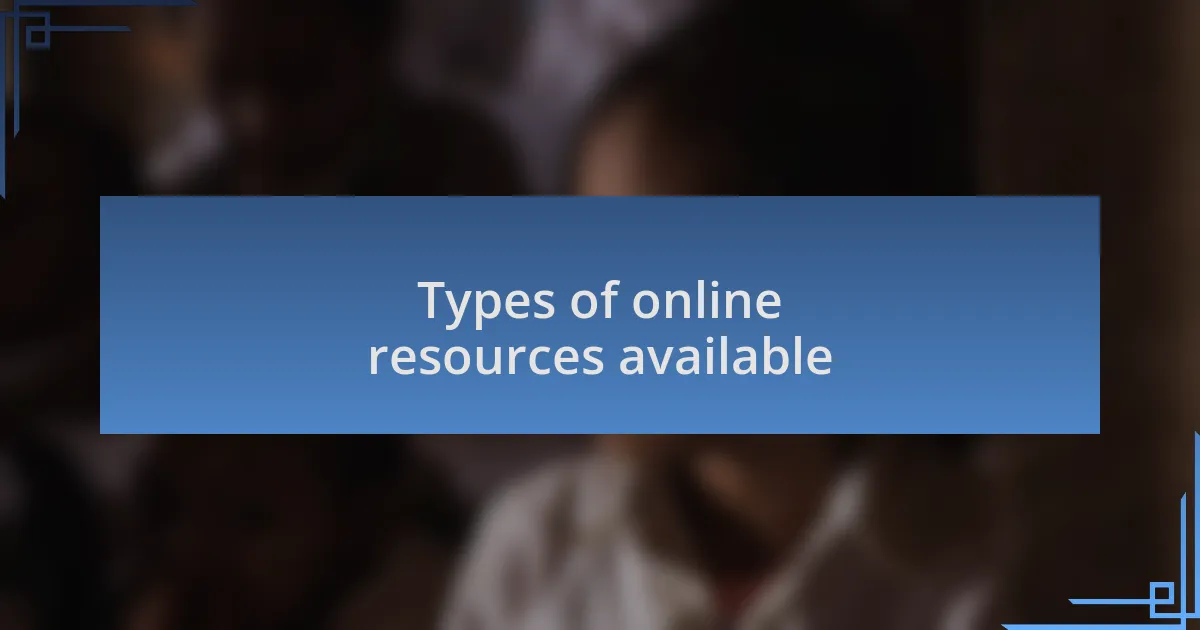
Types of online resources available
When it comes to online resources for dyslexia, I often find myself relying on educational websites that offer structured programs and exercises. These platforms frequently provide interactive lessons that adapt to a child’s learning pace. I remember using one such site with my son; the moment he succeeded in completing a module was a joyous victory for both of us, stirring a sense of empowerment that we hadn’t previously experienced.
Videos and tutorials are also invaluable. I came across one particularly engaging series that explained phonemic awareness through catchy songs and animations. It was remarkable to see my son physically react, clapping his hands to the rhythm while absorbing the material. Have you considered how such multimedia resources can transform a learner’s experience? They make challenging concepts much more relatable and digestible.
Lastly, there are numerous online forums and support groups where parents and educators exchange advice. I still remember a late-night discussion on a chat forum where someone shared a breakthrough technique that transformed their child’s reading skills. The shared wisdom often feels like a lifeline, offering not just insights but genuine encouragement. These spaces help reinforce the notion that we’re all learning together, which can be tremendously comforting when facing challenges.
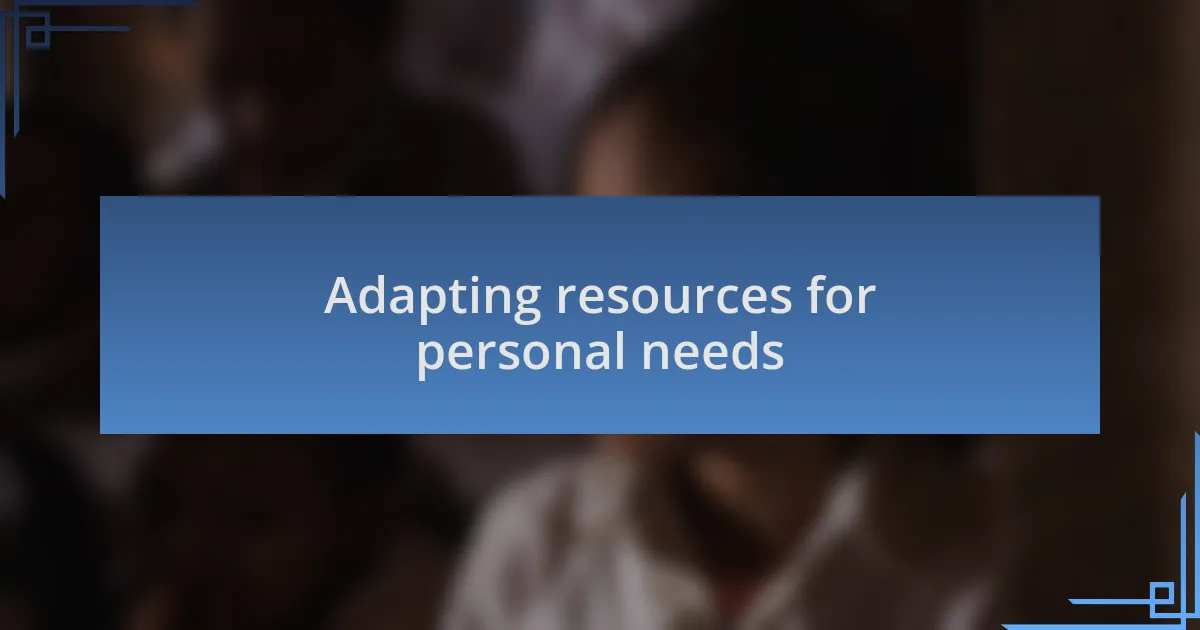
Adapting resources for personal needs
Adapting resources to meet personal needs is a vital part of my journey with dyslexia training. For instance, when I discovered a reading app, I realized I could adjust the font size and background color to make the text more readable for my son. It was a simple tweak, but the difference was profound; he seemed to relax and focus better, which encouraged him to engage more with the material. Have you ever considered how such minor adjustments can significantly impact a learner’s motivation?
I also modify lesson plans according to his interests. When he showed a passion for dinosaurs, I searched for stories and exercises featuring these prehistoric creatures. It amazed me how quickly he grasped complex ideas when they were linked to something he loved. Isn’t it powerful to think that personal interests can serve as a bridge to learning?
Moreover, embracing flexibility in my approach has been crucial. There are days when conventional methods fall short, and I’ve learned to pivot to alternative strategies—like using tactile resources or even collaborating with video learnings for visual stimulation. One afternoon, I set up a mini “scavenger hunt” with literacy tasks around the house, watching his eyes light up with excitement. It reminded me that sometimes the key to learning is simply breaking away from the norm. How do you find creative ways to keep learning experiences fresh and engaging?
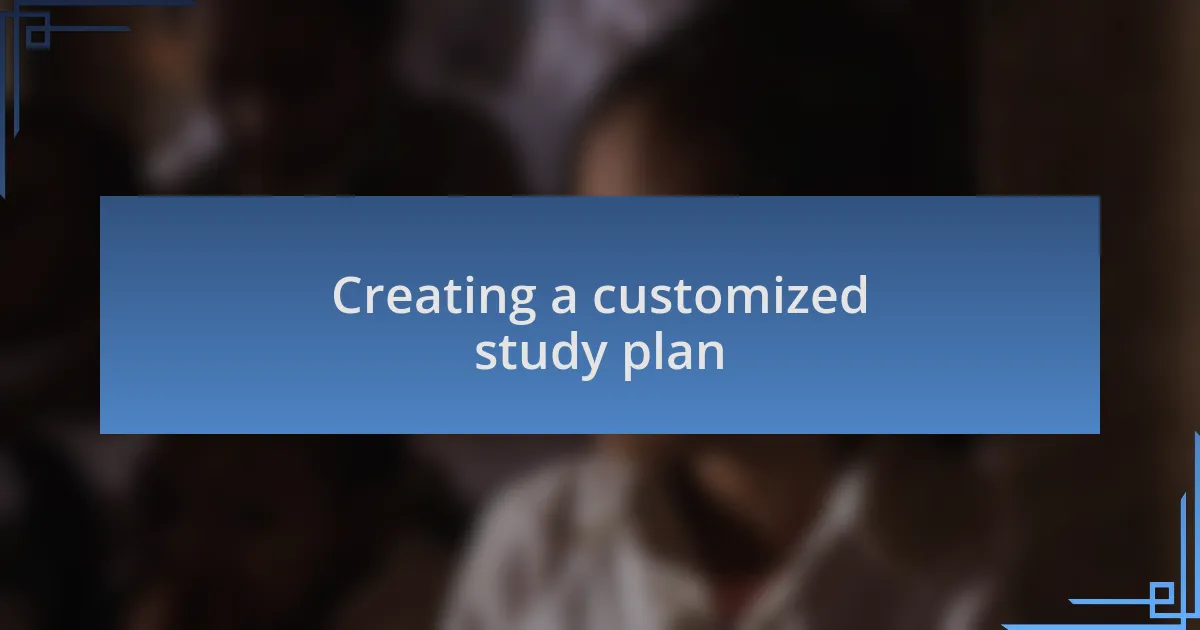
Creating a customized study plan
Creating a customized study plan starts with understanding the unique challenges and strengths of the learner. Reflecting on my son’s journey, I took the time to assess what motivated him. I discovered that scheduling study sessions between his favorite activities helped create a relaxed environment, allowing him to absorb information without feeling overwhelmed. Have you noticed how the right timing can transform learning into a more enjoyable experience?
In devising our study plan, I incorporated multiple learning styles to engage him fully. For instance, I blended auditory learning with visual aids, like using audiobooks alongside illustrated storybooks. I remember one evening, listening to him narrate a story after hearing it just once—a moment that filled me with pride. Doesn’t it amaze you how varied approaches can unlock hidden potential?
Additionally, I ensure to regularly review and adjust the plan based on his progress. It’s not just about sticking to a rigid schedule; it’s about being responsive to his needs. One week, I noticed he struggled with phonics, so I shifted focus and introduced fun, game-like activities that broke down the sounds. It was enlightening to see how a few small changes made a world of difference. Have you thought about how ongoing adjustments can lead to a more effective learning journey?
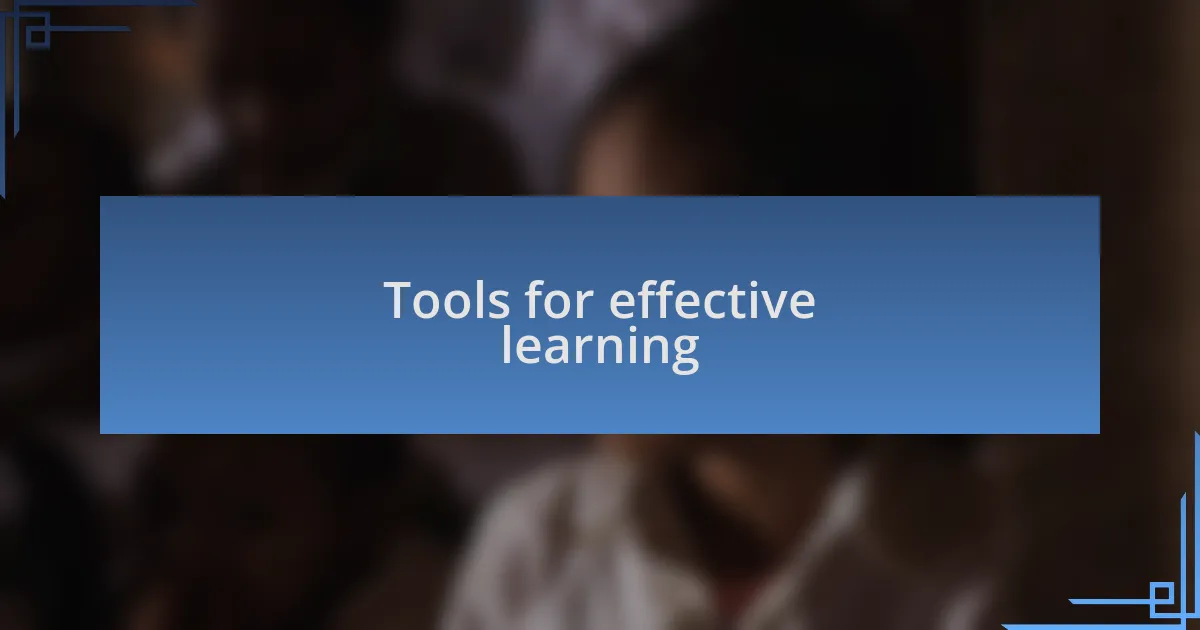
Tools for effective learning
Effective learning tools can make a significant difference in how we approach education. For my son, incorporating speech-to-text software was a game-changer. Initially, he hesitated to express his thoughts due to difficulties with writing, but once he started using this tool, I saw his confidence soar. Have you ever experienced that moment when a simple tool transforms frustration into elation?
In addition, visual organizers, such as mind maps, have proven invaluable. I recall introducing them during a particularly challenging homework assignment—watching him visually connect ideas on paper was like watching a light bulb flicker on. Suddenly, the concepts that once seemed abstract became tangible and manageable. It’s incredible how a little visualization can clarify complex information, isn’t it?
Another essential tool I’ve found beneficial is interactive learning software tailored for dyslexic learners. One time, while exploring a new app together, I noticed his excitement as he unlocked challenges that were previously daunting. This app not only made learning engaging but also built a sense of accomplishment with each task completed. Do you agree that the right tools can ignite a spark of motivation to keep learning?
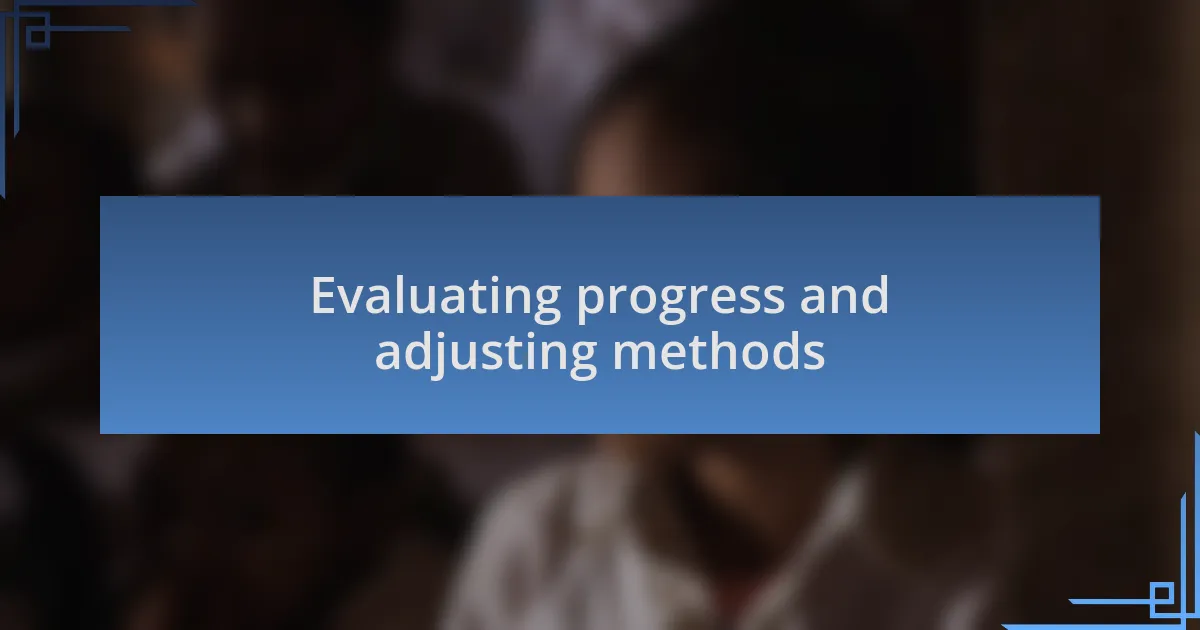
Evaluating progress and adjusting methods
Evaluating progress is crucial for ensuring that the strategies we adopt are genuinely effective. I remember a time when my son struggled with reading comprehension despite using various resources. By consistently assessing his understanding through informal quizzes and discussions, I realized it was time to tweak our approach, opting for more interactive materials that aligned better with his interests. Have you ever had to reassess your methods after seeing little improvement?
Adjusting methods based on evaluation can feel daunting, but it’s often necessary. After noticing that his initial motivation began to wane, I sought feedback from him about what was working and what wasn’t. His insights guided me to shift from traditional reading exercises to incorporating storytelling and multimedia that sparked his enthusiasm. This kind of open dialogue not only informed our next steps but also empowered him to take an active role in his learning. Isn’t it amazing how a small change can yield such significant results?
I find that continuous reflection fosters both growth and resilience. For instance, maintaining a dedicated journal to track his progress helped me identify patterns in his challenges and victories alike. When I noticed a spike in his writing skills after we shifted to more creative writing prompts, it was a clear signal to explore that avenue further. Have you considered keeping a progress log? It’s enlightening to see the journey unfold through words.